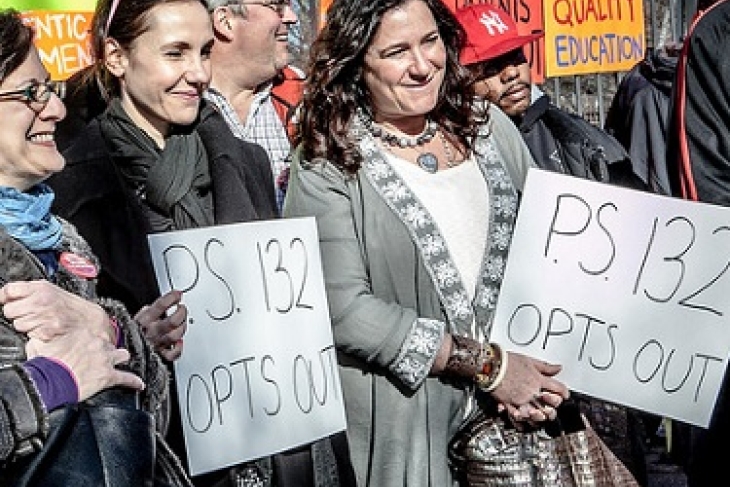This post has been updated with the full text of "Wanna opt out of tests? Try this instead"
There’s a bracing moment early in the 1991 movie Grand Canyon. A tow truck driver played by Danny Glover miraculously appears to rescue a stranded motorist played by Kevin Kline, who is being terrorized by thugs on a deserted Los Angeles street. Glover’s character appears, calmly hooks up the disabled car to his rig, and appeals to the gun-toting gang leader to let him and Kline go on their way.
“I'm gonna grant you that favor, but tell me this,” the gang leader says after a tense standoff, reminding the tow truck operator that he’s calling the shots. “Are you asking me as a sign of respect? Or are you asking because I've got the gun?”
“You ain't got the gun,” Glover replies, “we ain't having this conversation.”
I think of this scene every time I read a story about the “opt-out movement”—parents and others protesting the distorting effects of standardized testing in schools by refusing to let their children take the tests. Opt-out parents believe they have a gun pointed at testing. They might be right. But the opt-out movement could be even more powerful if it demanded an overdue conversation about the kind of education we want for our kids and the appropriate role of testing in our schools. By merely refusing tests, the opt-out movement gives away parental power that could be used to productively push back against the worst effects of testing, not just the tests themselves.
Let me start with a limited defense of testing. For all its faults, the data borne of standardized testing has shone a bright light on the dismal job our nation has done educating low-income children, black and Hispanic children, and other underserved populations. The opt-out movement seeks to weaponize that data, which has both produced a flowering of school choice and driven an age of education dynamism from which low-income kids have been the primary beneficiaries.
But you’d have to be blind or delusional not to acknowledge that in too many schools, perhaps most, the testing tail wags the education dog. Test-driven accountability was supposed to make low-performing schools look more like high performers. Too often, the opposite has happened. Schools respond to the pressures of testing by focusing disproportionately on tested subjects and grades and turning learning time into test prep, with the effect of reducing schooling to a test-focused grind for too many children.
Opting out solves none of that. It’s a kind of unilateral disarmament. It’s not entirely clear what the end game is of the opt-out movement. To end all testing? To throw sand in the education reform gears? A story on the liberal news service Alternet noted that "the whole school reform machine falls down without the data." That’s true, responded progressive blogger Lynnell Mickelsen. “So do the movements around climate change, civil rights, public health, banking reform, industrial safety, economic justice, and more.”
There may be a better way. Instead of refusing the tests, I’d love to see parents march into the principal’s or district superintendent’s office with a simple proposition (or a threat, if you prefer): “You don’t like tests; we don’t like tests. You don’t want to narrow the curriculum; we don’t want that either. You hate the pressures of testing; we hate the pressure put on our children. So here’s the deal. Teach our children a rich, robust curriculum—science, history, art, music, gym, and recess. Don’t bother with test prep. Don’t narrow the curriculum to make more time for tested subjects. If you do, our kids aren’t taking the test. Don’t waste our tax dollars on test prep books and practice tests, because if one comes home in our kids’ knapsacks, they’ll be staying home on test day.” In short, use the threat of test refusal to return sanity to schooling, not just as an act of civil disobedience.
I’ve long held that testing isn’t the problem. Test prep is the problem. It can suck the life out of a school’s curriculum, and it’s ineffective—particularly when it comes to reading comprehension. If a school’s answer to testing pressure is to spend more time on reading and less time on science, history, art, music, and other parts of the curriculum, they are actually making things worse, not better. University of Virginia cognitive scientist Dan Willingham says it best: “Teaching content is teaching reading.”
A plaintive open letter from teachers at one of New York City’s best-loved public schools, PS 321 in the affluent Park Slope neighborhood of Brooklyn, recently claimed that test-driven accountability means that teachers would be “forced to do more test prep…[e]ven though they know teaching to the test is bad teaching.” It’s far from clear to me why a school would knowingly engage in bad teaching, or why the value that PS 321’s earnest and undoubtedly talented teachers place on “intellectual curiosity, on creativity, on the arts [and] the love of learning” needs to be at risk from testing. One would assume that parents want those things for their children too. Why not insist that they remain in place and that testing be just another day at school?
Using threat of test refusal—and not merely opting out—could also solve an increasingly thorny problem for the opt-out movement, which so far seems to be sharply divided along lines of race and class. To date, those most likely to opt out are affluent and white; there have been relatively few test refusals in schools that primarily serve low-income children of color. Nationally, civil rights organizations continue to strongly support testing. That’s no surprise, since test data has made it impossible to ignore the generally poor performance of schools mostly educating black and Hispanic children—as well as children of color in diverse schools.
If the opt-out movement brings affluent parents and civil rights groups into conflict, leveraging the threat of opting-out could unite them and improve outcomes for both. A well-rounded curriculum is what good schools have traditionally offered and what low-income kids need most. This point is echoed by Jennifer Berkshire, a public education advocate who writes the blog Edushyster and is critical of much of the education reform agenda. She likes the idea. “I'm not as put off by the tests themselves as by the relentless hollowing out of the curriculum, and the definition of what schools are for, especially in low income areas,” she says. “I'd be all for marshaling parent armies to demand an end to this.”

